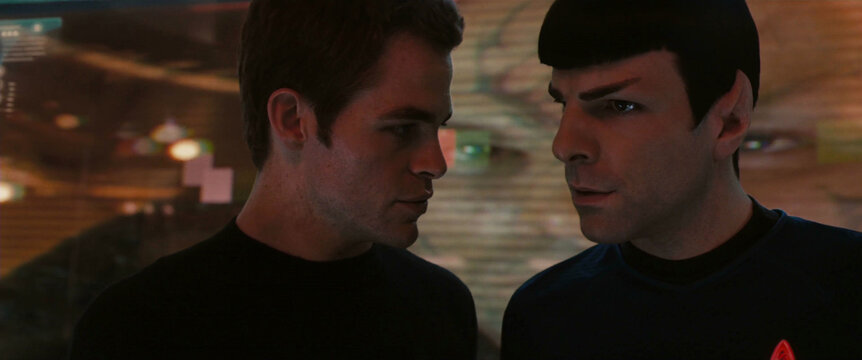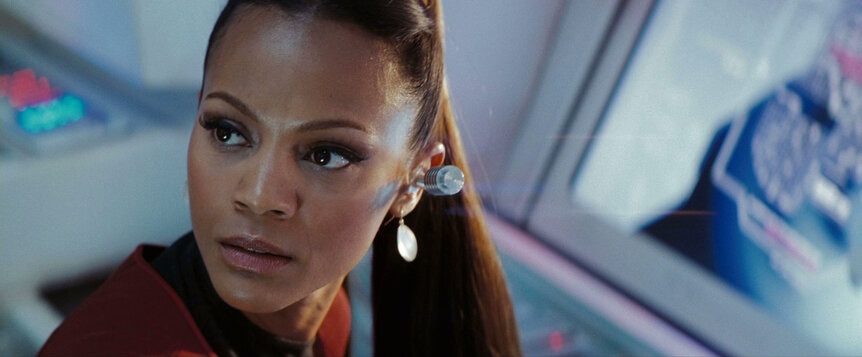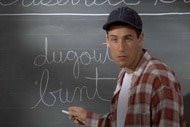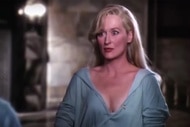Create a free profile to get unlimited access to exclusive videos, sweepstakes, and more!
10 years ago, J.J. Abrams' Star Trek reboot fueled the modern geek universe

This year, Ethan Peck and Anson Mount took on the roles of Spock and Captain Pike, respectively, in Star Trek: Discovery. Not too long ago, the idea of recasting Pike, Spock, Kirk, or even Spock’s dad was a tremendous gamble — would hardcore Trekkies, many of whom would have preferred these beloved characters preserved in amber, accept a new cast playing characters from the '60s? A decade ago, that question was answered in the affirmative when J.J. Abrams' movie Star Trek premiered to rave reviews, which not only saved the Trek franchise but helped shape the larger geek universe we’re living in today.
Directed by Abrams and written by Alex Kurtzman and Roberto Orci, the 2009 film was technically the 11th feature film in the franchise, and the first new official Trek release since the prequel series Star Trek: Enterprise had been canceled in 2005. At this point in time, the fledgling Marvel Cinematic Universe only consisted of one movie people actually liked (2008's Iron Man), Game of Thrones was still a fantasy novel from the '90s, the Harry Potter book series had only concluded a year prior, and the Star Wars prequels from 10 years before seemed to have ended that saga forever. Other than Doctor Who, which saw a revival in 2005, most established geeky fandoms weren’t expanding.
It might not have seemed like it at the time, but in many ways — at least when it comes to mainstream sci-fi — the 2009 Star Trek was like striking a match in a room full of nerdy gasoline.
In this version, the first time you see the good Captain Kirk onscreen (not as an infant) is as a bleach-blond child careening down a dirt road in his stepfather's stolen car to the tune of "Sabotage" by the Beastie Boys. It's appropriate, as Abrams' Star Trek feels like a car chase that lasts two hours and never slows down. For haters who thought Abrams played it safe with Star Wars: The Force Awakens in 2015, the 2009 Star Trek will seem like punk rock.
Fairly or not, before 2009 the Trek franchise had gained a reputation for being stodgy and perhaps a bit detached. In Ed Gross and Mark Altman's Fifty Year Mission Trek oral history books, Abrams is quoted saying, "as [Star Trek movies] went on and on ... they were less and less relatable." And so Abrams, Kurtzman, and Orci set out to make perhaps the most mainstream and relatable version of Star Trek ever. In several interviews (and also in The Fifty Year Mission) Orci said that the code word for the approach to writing the movie was “rock 'n' roll.”
Purists will tell you that because of this rock 'n' roll attitude, the 2009 Star Trek is all action shlock, that it actually guts the intellectual ruminations inherent to what supposedly makes Star Trek what it is. The problem with this criticism is that it ignores the fact that almost nothing about the 2009 Star Trek should work — because on paper it’s an absolutely absurd proposition.
How does a film satisfy the passing curiosity of the moviegoer uninterested in sci-fi and Star Trek but also make hardcore devotees happy, too? On top of that, how could such a movie also introduce new audiences to the entire universe and characters of Star Trek without a mountain of exposition? At least with Star Wars movies, people like Abrams and Rian Johnson have the help of that opening text crawl to fill the audience in on the relevant information and what's happened in previous installments. But with Star Trek, Abrams took a different approach: Make the movie an origin story. And, on top of that, make it an alternate universe origin story, just in case the purists get upset about canon problems.
And, 10 years later, all of these decisions still stand up. If you start watching the first five minutes of the movie, you’ll want to watch the whole thing. Every. Single. Time.
For longtime fans, perhaps the strangest thing about watching the 2009 Star Trek in 2019, and only a few weeks after the nostalgia-laden Season 2 finale of Star Trek: Discovery, is that, if you squint, it almost doesn’t feel like a reboot at all. If you were to ignore the fact that the USS Enterprise is supposedly a brand-new starship in this film, and that most of the movie happens in 2258, which puts it a few years earlier than the “real” original series, the entire film could scan as a passable sequel to the last scene of the Discovery Season 2 finale.
In Star Trek (2009), Spock (Zachary Quinto) and Pike (Bruce Greenwood) seem like they've been friends for a while, Starfleet is rebuilding its recruits after the events of the Klingon War, and for the most part, the aesthetic of the universe, more or less, feels like a natural progression of what we saw in Discovery. Fans who are overly preoccupied with these canon distinctions (and I’m one of those people, by the way) can get lost in debating all the ways in which Abrams and company’s alternate "Kelvin Timeline" doesn’t even play by its own rules, much less the rules of Star Trek in general. But numerous new directors and writers had rewritten the aesthetic of Star Trek many, many times before.
In 2017, Wrath of Khan director Nicholas Meyer compared the "text" of Star Trek to music and argued that in classical music, you see all sorts of different arrangements of established themes. "Star Trek has a text, it has an entire world. It has certain characters," Meyer said. "And that's the music. That’s all the different music. And so, my music is a little different."
So, if you think of the 2009 Star Trek reboot as Abrams reinterpreting the musicality of Star Trek and remixing it into a mashup of the Fast and the Furious franchise and Star Wars, then the movie will feel like edgy fan fiction. This fact is doubly true when you consider the fact that on some level, the 2009 Trek also feels like the one that is accessing the eroticism of Kirk and Spock the most overtly. This isn’t to say Chris Pine's Kirk and Quinto's Spock hook up in this movie, but there is a spark between the characters that was very clearly forged by the decades of fan fiction about Kirk/Spock.
In essence, because the 2009 Trek is a mainstream homage to an old franchise, it’s also paying respects to the more interesting parts of fandom — such as slash fiction — even if by accident. And, if you don’t think there’s sexual subtext between Kirk and Spock in this movie, then just try to explain nearly every Spock/Kirk scene in this film’s 2013 sequel, Star Trek Into Darkness, which was written and directed by all the same people.
But the best part of watching the 2009 Star Trek is realizing how the film seems like the beginning of a boom we're still enjoying. Famously, Chris Hemsworth plays Captain Kirk's father, George Kirk, in the opening scenes of the film, while Zoe Saldana's Uhura gives the film a much-needed female perspective in a sea of space-testosterone. Would Saldana and Hemsworth have gone on to be Avengers had they not been in Star Trek first? Would Pine have ended up in Wonder Woman as the heroic Steve Trevor? One thing is for sure: Current Star Trek executive producer Alex Kurtzman would certainly not be running the franchise now if he hadn't co-written this film.
When you rewatch the 2009 Trek, you might find yourself wondering why Abrams didn't choose the Beatie Boys' "Intergalactic" over "Sabotage." After all, the former mentions "another dimension" and even name-checks "Mr. Spock." The answer is simple: The movie is smart enough to not be that on-the-nose. This is a Star Trek movie for the masses, but it's still a Star Trek movie, meaning it's smarter than you realize.
In the in-universe story of the 2009 Trek, an alternate universe was created. But because Abrams, Kurtzman, and Orci approached Star Trek like they were the Beastie Boys remixing classic sci-fi, they created the pop culture universe we're happily still living in today.
The views and opinions expressed in this article are the author's, and do not necessarily reflect those of SYFY WIRE, SYFY, or NBC Universal.
















